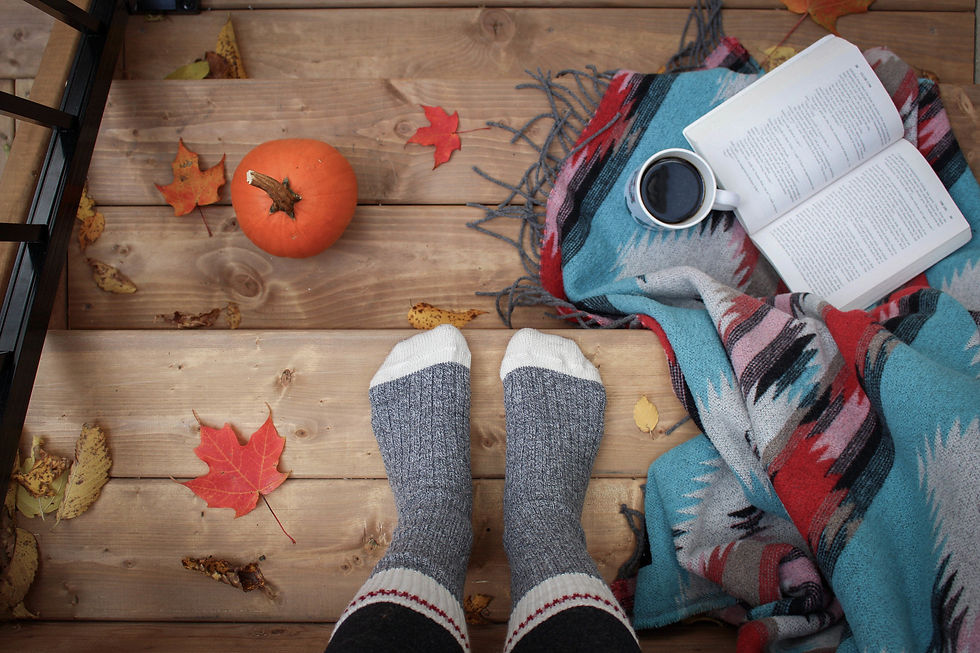5 ways to transition into the Fall with Acupuncture
- Tyler Phillipson

- Aug 29, 2024
- 3 min read
Updated: Aug 11, 2025
Fall is a season of transition, both in nature and in our bodies. As the weather cools and daylight hours shorten, it's important to adjust your lifestyle to align with the changes.
We're gearing up to say goodbye to long nights and ice-cream treats and hello to cozy sweaters and warm feet!

Here are some lifestyle recommendations for the fall to help you stay healthy, balanced, and in tune with the season:
1. Adjust Your Diet
Emphasize Warm, Cooked Foods: Shift from the lighter, cooling foods of summer to warmer, cooked meals. Soups, stews, roasted vegetables, and whole grains are ideal. Incorporate seasonal produce like squash, sweet potatoes, apples, and pears.
Use Warming Spices: Add spices like ginger, cinnamon, cloves, and turmeric to your meals to promote warmth and improve digestion.
Hydrate: Even though it's cooler, it's still important to stay hydrated. Herbal teas, especially those with warming herbs, can be comforting and hydrating.
Acupuncture: Fall is a time when digestion can become sluggish, particularly with the increase in heavier, warming foods. Acupuncture can help regulate the digestive system, alleviating issues like bloating, constipation, or diarrhea.
2. Support Your Immune System
Boost Immunity: As fall is the start of cold and flu season, focus on immune-boosting foods like garlic, onions, ginger, and mushrooms. Consider taking supplements such as vitamin C, vitamin D, and zinc.
Get Enough Sleep: With shorter days, aim to get sufficient rest. Sleep is crucial for immune function and overall health.
Acupuncture can help boost your immune system by stimulating specific points that enhance the body's natural defenses. This makes you less susceptible to colds, flu, and other respiratory infections common during the fall.
3. Exercise Regularly
Stay Active: Regular physical activity helps maintain circulation and keeps the body warm. Outdoor activities like hiking, walking, or cycling are great, especially when you can enjoy the fall foliage.
Warm-Up Properly: As temperatures drop, it’s important to warm up properly before exercising to prevent injury.
4. Dress Appropriately
Layer Up: Wear layers to adjust to the fluctuating temperatures throughout the day. Keep your neck and chest covered to protect against cold drafts, which can make you more susceptible to colds.
Choose Warm Fabrics: Opt for natural fabrics like wool, cotton, and flannel, which are breathable and help maintain body warmth.
Acupuncture: The drop in temperature can cause muscles and joints to stiffen, leading to discomfort or pain. Acupuncture improves circulation and warms the body, helping to alleviate stiffness and pain, particularly in the neck, shoulders, and lower back.
5. Practice Mindfulness and Emotional Health
Reflect and Let Go: Fall is a time of introspection, mirroring the shedding of leaves. Reflect on the past year, set new intentions, and let go of things that no longer serve you.
Stay Connected: Seasonal changes can sometimes lead to feelings of loneliness or sadness. Stay connected with loved ones, and seek out social activities that bring you joy and comfort.
Emotional Balance: The shorter days and reduced sunlight can trigger feelings of sadness, lethargy, or Seasonal Affective Disorder (SAD). Acupuncture can help regulate the body’s production of serotonin and other neurotransmitters, improving mood and reducing symptoms of depression and anxiety.
Acupuncture is known for its stress-relieving benefits. During the fall, when the body and mind are adjusting to the changes in temperature, light, and routine, acupuncture can help reduce stress and promote relaxation.
If you are curious about working with Acupuncture and Chinese Medicine to support you or your loved ones as you transition into the Fall season, consider booking an appointment with a local practitioner in your area soon.
Happy last days of Summer!




